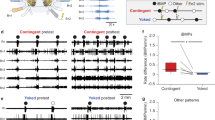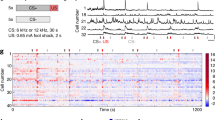Abstract
Learning can lead to changes in the intrinsic excitability of neurons. However, the extent to which these changes persist and the role they have in the expression of memory remain unclear. We found that in vitro analogs of operant conditioning produced a long-term (24 h) increase in the excitability of an identified neuron (B51) that is critical for the expression of feeding in Aplysia. This increase in excitability, which was cAMP dependent, contributed to the associative modification of the feeding circuitry, providing a mechanism for long-term memory.
This is a preview of subscription content, access via your institution
Access options
Subscribe to this journal
Receive 12 print issues and online access
$209.00 per year
only $17.42 per issue
Buy this article
- Purchase on Springer Link
- Instant access to full article PDF
Prices may be subject to local taxes which are calculated during checkout



Similar content being viewed by others
References
Martin, S.J. & Morris, R.G.M. Hippocampus 12, 609–636 (2002).
Zhang, W. & Linden, D.J. Nat. Rev. Neurosci. 4, 885–900 (2003).
Skinner, B.F. The Behavior of Organisms: An Experimental Analysis (Appleton-Century-Crofts, New York, 1938).
Brembs, B., Lorenzetti, F.D., Reyes, F.D., Baxter, D.A. & Byrne, J.H. Science 296, 1706–1709 (2002).
Nargeot, R., Baxter, D.A. & Byrne, J.H. J. Neurosci. 17, 8093–8105 (1997).
Nargeot, R., Baxter, D.A. & Byrne, J.H. J. Neurosci. 19, 2247–2260 (1999).
Nargeot, R., Baxter, D.A. & Byrne, J.H. J. Neurosci. 19, 2261–2272 (1999).
Plummer, M.R. & Kirk, M.D. J. Neurophysiol. 63, 539–558 (1990).
Lorenzetti, F.D., Mozzachiodi, R., Baxter, D.A. & Byrne, J.H. Nat. Neurosci. 9, 17–19 (2006).
Scholz, K.P. & Byrne, J.H. Science 240, 1664–1666 (1988).
Lorenzetti, F.D., Baxter, D.A. & Byrne, J.H. Neuron (in the press).
Kandel, E.R. Science 294, 1030–1038 (2001).
Scholz, K.P. & Byrne, J.H. Science 235, 685–687 (1987).
Cleary, L.J., Lee, W.L. & Byrne, J.H. J. Neurosci. 18, 5988–5998 (1998).
Antonov, I., Antonova, I., Kandel, E.R. & Hawkins, R.D. J. Neurosci. 21, 6413–6422 (2001).
Acknowledgements
This work was supported by National Institute of Mental Health grant MH 58321.
Author information
Authors and Affiliations
Corresponding author
Supplementary information
Supplementary Text and Figures
Supplementary Figures 1 and 2 and Methods (PDF 196 kb)
Rights and permissions
About this article
Cite this article
Mozzachiodi, R., Lorenzetti, F., Baxter, D. et al. Changes in neuronal excitability serve as a mechanism of long-term memory for operant conditioning. Nat Neurosci 11, 1146–1148 (2008). https://doi.org/10.1038/nn.2184
Received:
Accepted:
Published:
Issue Date:
DOI: https://doi.org/10.1038/nn.2184
This article is cited by
-
Changes in the Electrical Characteristics of Premotor Interneurons and Serotonin-Containing Modulator Snail Neurons upon Developing a Contextual Conditioned Reflex and Its Reconsolidation
BioNanoScience (2023)
-
Identification of an allatostatin C signaling system in mollusc Aplysia
Scientific Reports (2022)
-
Changes in Membrane and Threshold Potentials of Command Neurons in Terrestrial Snail during Development of a Conditioned Situational Defensive Reflex
Bulletin of Experimental Biology and Medicine (2020)
-
Effects of Serotonin Receptor Antagonist Methiothepin on Membrane Potential of Premotor Interneurons of Naïve and Learned Snails
BioNanoScience (2018)
-
Influence of a Nitric Oxide Donor on Electrical Characteristics of the Premotor Interneurons of Terrestrial Snails
BioNanoScience (2016)



